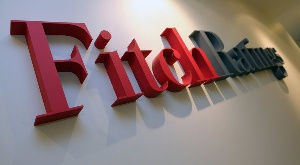Fitch Ratings has assigned Ghana’s USD1bn partially guaranteed notes a final ‘BB-‘ rating. The bonds benefit from a partial credit guarantee (PCG) provided by the International Development Association (IDA) for scheduled debt service payments of up to 40% of the original principal.
While the IDA PCG can be used to cover debt service payments, reducing the bonds’ potential for default, Fitch believes the primary benefit of the guarantee is to increase the possible recovery in the event of issuer default. Fitch believes the PCG-protected issue will have a higher likelihood of recovery than other unsecured bonds of Ghana. Consequently, we conducted the analysis using our Criteria for Evaluating Third-Party Partial Credit Guarantees, which focus on potential recovery levels.
KEY RATING DRIVERS
Issuer’s Credit Quality
The analysis of Ghana’s ability to meet its contractual obligations in a timely manner is the starting point of the rating analysis of the PCG instrument. Ghana’s Long-term foreign and local currency Issuer Default Ratings are ‘B’ with Negative Outlooks (see “Fitch Affirms Ghana at ‘B’; Outlook Negative” dated 18 September 2015 at www.fitchratings.com).
Additional Recovery Provided by Guarantee The PCG provides enhanced recovery to the guaranteed bond relative to other unsecured creditors. When considering the structure and the fact that the guarantee cannot be accelerated, Fitch expects the total recovery on the PCG notes to be at the upper end of the ‘RR3’ category (51%-70% recovery), above the normal unsecured recovery rate band ‘RR4? of 31%-50%, which is typically assumed for Fitch-rated entities.
Guarantee Structure The PCG is structured so that it ensures timely payments of scheduled debt service as it can be drawn to meet timely scheduled payments until fully drawn. This offers some additional liquidity and potential credit benefit to bondholders. However, the PCG notes have a cross-default clause in the event of a default of other sovereign debt, which could trigger a crossdefault that would allow bondholders to accelerate the notes, rendering the PCG insufficient to make the accelerated payment.
Guarantee Provider
The PCG’s impact on the notes’ rating depends on the credit quality of the guarantor and the relationship of the guarantor to the underlying obligor. Fitch believes the credit quality of IDA is consistent with other World Bank Group members. Furthermore, Fitch believes IDA is a preferred creditor to Ghana and its participation provides additional credit support to the transaction.
TRANSACTION SUMMARY
The notes form part of Ghana’s budget financing and debt management strategy for 2015, and are being used solely for refinancing existing debt. As part of its programme for Ghana, IDA is making available a PCG of up to USD400m, which is intended to support Ghana’s external debt financings.
Recovery proceeds will be dependent upon the sovereign default scenario, IDA’s overall role within the workout process, the use of subrogation rights and the ultimate recovery levels received by unsecured creditors. Fitch ran various scenarios assuming the receipt of the USD USD400m PCG would be received over the first four years of the bond and these scenarios resulted in estimated recovery proceeds being at the upper end of the 51%-70% recovery band. This 51%-70% result assumes the unsecured recovery rate is at lower end of the band ‘RR4’ of 31%-50%. Pursuant to Fitch’s criteria, this recovery rate would allow for a one-notch rating uplift from Ghana’s IDR. A higher recovery band of ‘RR2? could be consistent with a two-notch rating uplift.
The PCG is structured in a way to meet timely payments of scheduled debt service in most circumstances. The PCG can be drawn to meet timely scheduled payments until fully drawn. While this feature might prevent the PCG bond from defaulting on its scheduled debt service payments, Ghana could be in default on other bonds which might trigger a cross default. This cross default could allow bondholders to accelerate the note and in these circumstances timely debt service would not be met as the guarantee cannot be accelerated and would not be sufficient to meet these payments. Nevertheless, it is uncertain whether bondholders would have an incentive to accelerate the notes.
Fitch believes the credit quality of IDA is consistent with other World Bank Group members. IDA is a supranational institution based in Washington DC; it is one of the four financial institutions of the World Bank Group, together with International Bank for Reconstruction and Development (rated AAA), International Finance Corporation, and Multilateral Investment Guarantee Agency. IDA capital is owned by its 173 member states. The three largest shareholders – the US, the UK and Japan – together own 25% of capital. IDA’s mission is to distribute concessional loans, grants and, to a lesser extent, guarantees, to poor countries; only member state can benefit from IDA financing. IDA enjoys a de facto preferred creditor status meaning the sovereign may place priority on debt repayments to multilateral institutions during times of financial distress.
An IMF programme in place is intended to provide financing, policy direction and monitoring and address Ghana’s key credit weakness through prioritising fiscal consolidation, raising revenue and improving the central bank’s credibility. Fiscal consolidation efforts in 1H15 remain on track. Fitch forecasts a fiscal deficit of 7.8% of GDP in 2015, slightly higher than the authorities’ figures of 7.3%. However, a high degree of uncertainty remains ahead of parliamentary and presidential elections due by late 2016, which may see spending pressures re-emerge and fiscal consolidation go off track. Ghana’s interest burden is highest of Fitch-rated sub-Saharan African sovereigns. Ghana’s external position is vulnerable and its growth prospects have been undermined by its fiscal and external imbalances, the country’s key rating weaknesses.
RATING SENSITIVITIES
The notes’ rating is sensitive to Ghana’s sovereign rating. A change in Fitch’s assessment of Ghana’s credit quality would result in a change in the notes’ rating.
Business News of Thursday, 15 October 2015
Source: Reuters
Fitch Rates Ghana's Partially Guaranteed Notes 'BB-'
Entertainment












